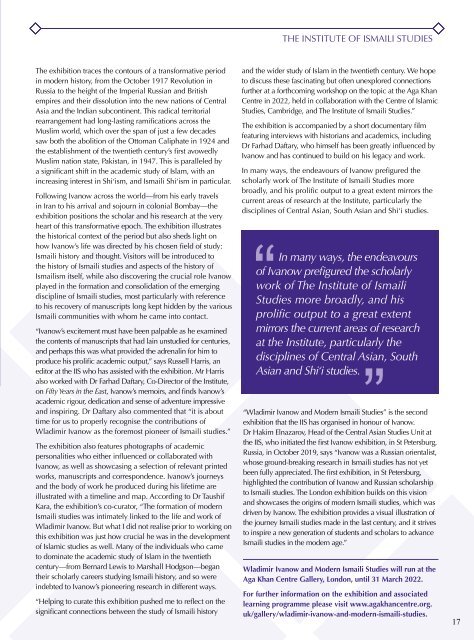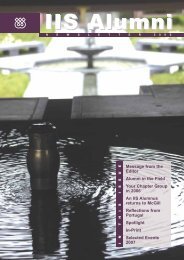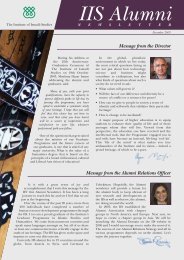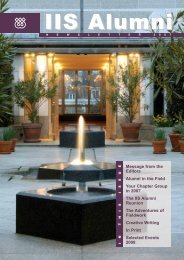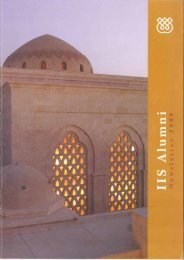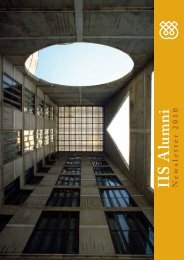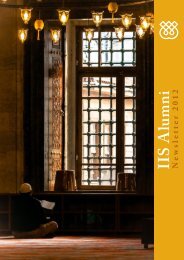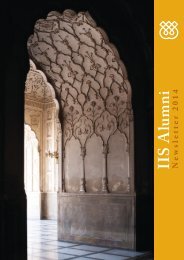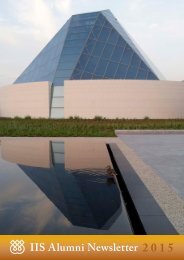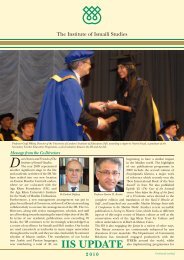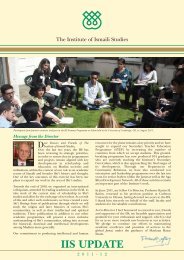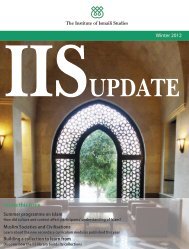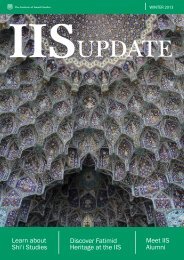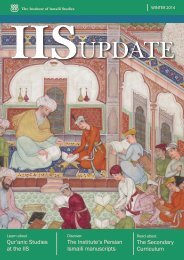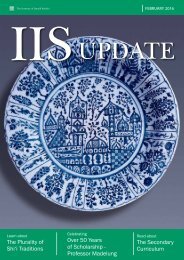IIS UPDATE Magazine Edition 20
Create successful ePaper yourself
Turn your PDF publications into a flip-book with our unique Google optimized e-Paper software.
THE INSTITUTE OF ISMAILI STUDIES<br />
The exhibition traces the contours of a transformative period<br />
in modern history, from the October 1917 Revolution in<br />
Russia to the height of the Imperial Russian and British<br />
empires and their dissolution into the new nations of Central<br />
Asia and the Indian subcontinent. This radical territorial<br />
rearrangement had long-lasting ramifications across the<br />
Muslim world, which over the span of just a few decades<br />
saw both the abolition of the Ottoman Caliphate in 1924 and<br />
the establishment of the twentieth century’s first avowedly<br />
Muslim nation state, Pakistan, in 1947. This is paralleled by<br />
a significant shift in the academic study of Islam, with an<br />
increasing interest in Shi‘ism, and Ismaili Shi‘ism in particular.<br />
Following Ivanow across the world—from his early travels<br />
in Iran to his arrival and sojourn in colonial Bombay—the<br />
exhibition positions the scholar and his research at the very<br />
heart of this transformative epoch. The exhibition illustrates<br />
the historical context of the period but also sheds light on<br />
how Ivanow’s life was directed by his chosen field of study:<br />
Ismaili history and thought. Visitors will be introduced to<br />
the history of Ismaili studies and aspects of the history of<br />
Ismailism itself, while also discovering the crucial role Ivanow<br />
played in the formation and consolidation of the emerging<br />
discipline of Ismaili studies, most particularly with reference<br />
to his recovery of manuscripts long kept hidden by the various<br />
Ismaili communities with whom he came into contact.<br />
“Ivanow’s excitement must have been palpable as he examined<br />
the contents of manuscripts that had lain unstudied for centuries,<br />
and perhaps this was what provided the adrenalin for him to<br />
produce his prolific academic output,” says Russell Harris, an<br />
editor at the <strong>IIS</strong> who has assisted with the exhibition. Mr Harris<br />
also worked with Dr Farhad Daftary, Co-Director of the Institute,<br />
on Fifty Years in the East, Ivanow’s memoirs, and finds Ivanow’s<br />
academic rigour, dedication and sense of adventure impressive<br />
and inspiring. Dr Daftary also commented that “it is about<br />
time for us to properly recognise the contributions of<br />
Wladimir Ivanow as the foremost pioneer of Ismaili studies.”<br />
The exhibition also features photographs of academic<br />
personalities who either influenced or collaborated with<br />
Ivanow, as well as showcasing a selection of relevant printed<br />
works, manuscripts and correspondence. Ivanow’s journeys<br />
and the body of work he produced during his lifetime are<br />
illustrated with a timeline and map. According to Dr Taushif<br />
Kara, the exhibition’s co-curator, “The formation of modern<br />
Ismaili studies was intimately linked to the life and work of<br />
Wladimir Ivanow. But what I did not realise prior to working on<br />
this exhibition was just how crucial he was in the development<br />
of Islamic studies as well. Many of the individuals who came<br />
to dominate the academic study of Islam in the twentieth<br />
century—from Bernard Lewis to Marshall Hodgson—began<br />
their scholarly careers studying Ismaili history, and so were<br />
indebted to Ivanow’s pioneering research in different ways.<br />
“Helping to curate this exhibition pushed me to reflect on the<br />
significant connections between the study of Ismaili history<br />
and the wider study of Islam in the twentieth century. We hope<br />
to discuss these fascinating but often unexplored connections<br />
further at a forthcoming workshop on the topic at the Aga Khan<br />
Centre in <strong>20</strong>22, held in collaboration with the Centre of Islamic<br />
Studies, Cambridge, and The Institute of Ismaili Studies.”<br />
The exhibition is accompanied by a short documentary film<br />
featuring interviews with historians and academics, including<br />
Dr Farhad Daftary, who himself has been greatly influenced by<br />
Ivanow and has continued to build on his legacy and work.<br />
In many ways, the endeavours of Ivanow prefigured the<br />
scholarly work of The Institute of Ismaili Studies more<br />
broadly, and his prolific output to a great extent mirrors the<br />
current areas of research at the Institute, particularly the<br />
disciplines of Central Asian, South Asian and Shi‘i studies.<br />
In many ways, the endeavours<br />
of Ivanow prefigured the scholarly<br />
work of The Institute of Ismaili<br />
Studies more broadly, and his<br />
prolific output to a great extent<br />
mirrors the current areas of research<br />
at the Institute, particularly the<br />
disciplines of Central Asian, South<br />
Asian and Shi‘i studies.<br />
“Wladimir Ivanow and Modern Ismaili Studies” is the second<br />
exhibition that the <strong>IIS</strong> has organised in honour of Ivanow.<br />
Dr Hakim Elnazarov, Head of the Central Asian Studies Unit at<br />
the <strong>IIS</strong>, who initiated the first Ivanow exhibition, in St Petersburg,<br />
Russia, in October <strong>20</strong>19, says “Ivanow was a Russian orientalist,<br />
whose ground-breaking research in Ismaili studies has not yet<br />
been fully appreciated. The first exhibition, in St Petersburg,<br />
highlighted the contribution of Ivanow and Russian scholarship<br />
to Ismaili studies. The London exhibition builds on this vision<br />
and showcases the origins of modern Ismaili studies, which was<br />
driven by Ivanow. The exhibition provides a visual illustration of<br />
the journey Ismaili studies made in the last century, and it strives<br />
to inspire a new generation of students and scholars to advance<br />
Ismaili studies in the modern age.”<br />
Wladimir Ivanow and Modern Ismaili Studies will run at the<br />
Aga Khan Centre Gallery, London, until 31 March <strong>20</strong>22.<br />
For further information on the exhibition and associated<br />
learning programme please visit www.agakhancentre.org.<br />
uk/gallery/wladimir-ivanow-and-modern-ismaili-studies.<br />
17


